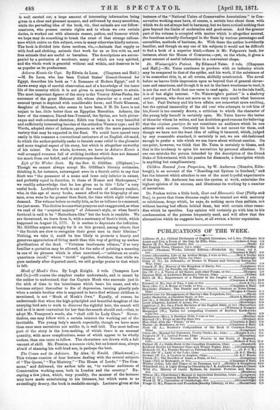Life of Sir Walter Scott. By the Rev. G. Gilfillan.
(Oliphant.)— Though we cannot always accept Mr. Gilffilan's literary estimates, thinking it, for instance, extravagant even in a Scotch critic to say that Scott was "the possessor of a name and fame only inferior in extent, and probably equal in duration, to those of Homer and Shakespeare," we readily acknowledge that he has given us in this " Life " a very useful book. Lockhart's work is out of the reach of ordinary readers, who, in this age of many books, cannot afford to the biography of one man, even were he far greater than Scott, the time which eight volumes demand. The volume before us really hits, as far as fullness is concerned, the just mean. The diction is somewhat pompous and exaggerated, as when we read of the " sceptral majesty" of Johnson's style, or when Scott's forehead is said to be "Matterhorn-like," but the book is readable. We are threatened, we learn from it, with a centenary of Scott's birth, which happened on August 15, 1771. It is useless to deprecate the infliction. Mr. Gilfillan argues strongly for it on this ground, among others, that "the Scotch are slow to recognize their great men in their lifetime." Nothing, we take it, could be leas likely to promote a hearty and generous appreciation of living merit than this way of getting up useless glorifications of the dead. " Virtutem incolumem odimus," if so very familiar a quotation may be allowed, for the sake of pointing a meaning in one of its phrases which is often unnoticed,—" sublatam ex oculis quaerimcis invidi," where " invidi " signifies, doubtless, that while we gaze uselessly after departed merit, we still grudge praise to that which is left.


































 Previous page
Previous page